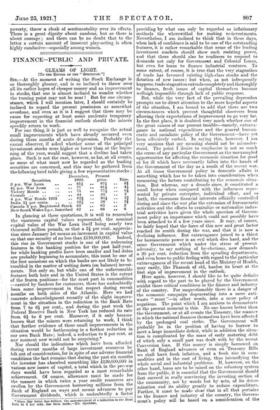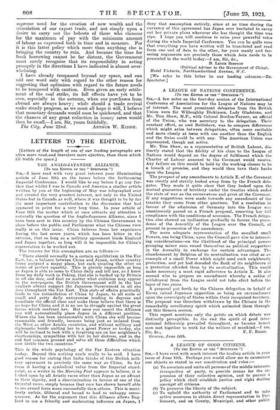FINANCE—PUBLIC AND PRIVATE.
GLEAMS OF LIGHT. [To .ma EDITOR OP TEE "SPECTATOR."] Slit, —At the moment of 'writing the Stock Exchange is so thoroughly gloomy, and is so inclined to throw over all its earlier hopes of cheaper money- and an improvement in stocks, that one is almost inclined to wonder whether the turning point may not be near I But for one circum- stance, 'which I will mention later, I should certainly be inclined to regard the present pessimism as somewhat overdone, and even as it is I suggest that there may be cause for .expecting at least some moderate temporary improvement in the financial outlook should the miners speedily return to work. For one thing, it is just as well to recognize the actual small improvements which have already occurred even during these months of acute depression. Probably the casual observer, if asked whether some of the principal investment stocks were higher or lower than at the begin- ning of the year, would suggest that a decline had taken place. Such is not the case, however, so far, at all events, as some of what must now be regarded as the leading securities are concerned, and this may be gathered from the-following brief table giving a few representative stocks :
December, Present
Secusities. 1920. price. Rise.
5 p.c. War Loan
.. 871 .. 5/ p.c. War Loan • . .. 77 .. 81k .. 4k Victory Bonds .. .. 71 .. 771 .. 61
Console . • • • • • ..
44 .. 46 .. 2 4 p.c. War Bonds 1928 .. 921 ..
95} ..
21
India 3j per cents. .. ..
52f .. 56 ..
3
Canada 3 p.c. Registered Stock 63 65 .. 2 New South Wales :3 p.c. Inscribed 82 .. 68 6
In glancing at these quotations, it is well to remember the enormous capital values represented, the nominal capital value of the War Loan itself being nearly two thousand million pounds, so that a 5i per cent. apprecia- tion since. January.lst means an increment in capital value on •that one security of no less than £110,000,000. Indeed, this rise in Government stocks is one of the redeeming features in the banking position for the past half-year, for while banking profits have been smaller and bad debts are probably beginning to accumulate, this must be one of the first occasions on which the banks are not likely to be troubled in the matter of writing down (on balance) invest- ments. Not only so, but while one of the unfavourable features both here and in the United States is the extent of the frozen positions—for the most part in commodities —carried by bankers for customers, there has undoubtedly been some improvement in that -respect during recent months on both sides of the Atlantic. Here we had concrete acknowledgment recently of the slight improve- ment in the situation in the reduction in the Bank Rate from 7- to per cent., and during the past week the Federal Reserve Bank in New York has reduced its rate from 6i to 6 per cent. Moreover, if it only became known that the miners were returning to work, I think that further evidence of these small improvements in the situation would be forthcmning in a further reduction in our own Bank Rate; indeed, a reduction to 6 per cent. at any moment now would not be surprising.* Nor should the indications which have been afforded during recent months of large investment resources be left out of consideration, for in spite of our adverse financial conditions the fact remains that during the past six months the investor has absorbed something like £120;000,000 in various new issues of capital, a total which in the pre-war days would have been regarded as a most remarkable achievement. Of course, allowance must be made for the manner in which. twice a year credit resources are swollen by the Government borrowing millions from the Bank of England on ways and means advances to pay Government dividends, which is undoubtedly a factor -•• Sines Ibis letter was written the announcement of a seduction in the Bank Late to 6 per cent. has been made.—ED. Spectator. providing by what can only be regarded as inflationary methods the wherewithal for making re-investments. Nevertheless, I am inclined to think that in these days, when lack of confidence is said to be one of the outstanding features, it is rather remarkable that some of the leading investment markets should show such resisting power, and that there should also be readiness to respond to demands not only for Government and Colonial Loans, but even for loans to finance industrial ventures. To some extent, of course, it is true that the very stagnation of trade has favoured existing high-class stocks and the ,flotation of new issues : but when, as not infrequently happens, trade stagnation extends completely and thoroughly to finance, fresh issues -of capital themselves become wellnigh impossible through lack of public response. But, while the very fact of the prevailing depression prompts me to direct attention to the more hopeful aspects of the situation, I am bound to add that there are two circumstances which prevent thoughtful observers from allowing their expectations of improvement to go very far. In the ffist place, it is doubted very much whether one of the great causes of our present trouble—namely, extrava- gance in national expenditure and the general bureau- cratic and socialistic policy of the Government—have yet been effectively curbed. In saying this, however, I am very anxious that my meaning should not be misunder- stood. The point I desire to emphasize is not so much the errors of any particular Government as the unexampled opportunities for affecting the economic situation for good or for ill which have necessarily fallen into the hands of the Government of the day as a result of the recent war. At all times Government policy in domestic affairs is something which has to be taken into consideration when measuring the factors contributing to the economic situa- tion. But whereas, say a decade since, it constituted a small factor when compared with the influences repre- sented by private enterprise, individual effort, and so forth, the enormous financial interests officially controlled during and since the war plus the extension of bureaucratic activities and the efforts to centralize or nationalize indus- trial activities have given the whole question of Govern- ment policy an importance which could not possibly have been attached to it a few years since. It may, of course, be fairly hoped that the force of this new and great factor reached its zenith during the war, and that it is now a declining influence. But extravagance joined to .a thirst for bureaucratic power is an evil which dies hard, and the same Government which under the stress of present adversity, to say nothing of by-elections, now demands a 20 per cent. reduction from the spending departments, and even bows to public feeling-with regard to the particular extravagances of the recent head. of the. Ministry of Health, may easily, like Pharaoh of old, harden its heart at the first sign of improvement in the outlook. Here again, however, I should like to be quite definite with regard to the part to be played by the Government amidst these critical conditions in the finance and industry of the country. For unquestionably there is a danger of the economic campaign degenerating into a mere anti- -waste " stunt "—in other words, into a mere policy of negations. The point which I am anxious to demonstrate at the present moment is this. No one knows better than the Government, or at all events the. Treasury, the manner in which the -national finances themselves have been affected by the prolonged coal strike. The Government will probably be in the position of having to borrow to meet a large immediate deficit, while in, addition the situa- tion is complicated by •the mass of early maturing debt of which only a small part was dealt with by the recent Conversion loan. If this money is simply borrowed on Bank of England advances or even on Treasury Bills we shall have fresh inflation, and a fresh rise in com- modities and in the cost of living, thus intensifying the whole social and industrial problems. If, however, on the other hand, loans are to be raised on the voluntary system from the public, it is essential that the Government should first succeed in really convincing the investing section of the community, not by words but by acts, of its deter- mination and its .ability greatly to reduce expenditure. Further, it must be made clear that in all that pertains to the finance and industry of the country, the Govern- ment's policy will be based on a consideration of the supreme need for the creation of new wealth and the stimulation of our export trade, and not simply upon a desire to carry out the behests of those who clamour for the maximum of pay with the minimum amount of labour as expressed both in time and in measure. For it is this latter policy which more than anything else is bringing the country to ruin. And because the time for fresh borrowing cannot be far distant, the Government must surely recognize that its responsibility in acting promptly in the directions I have indicated is almost over- whelming.
I have already trespassed beyond my space, and can add one word only with regard to the other reason for suggesting that optimism with regard to the future needs to be tempered with caution. Even given an early settle- ment of the coal strike, its full effects have yet to be seen, especially in the autumn, when our purchases from abroad are always heavy; while should a trade revival make steady progress, as we must all hope it will, I believe that monetary demands would soon be quickened, and that the chances of any great reduction in money rates would then be small.—I am, Sir, yours faithfully,



































 Previous page
Previous page